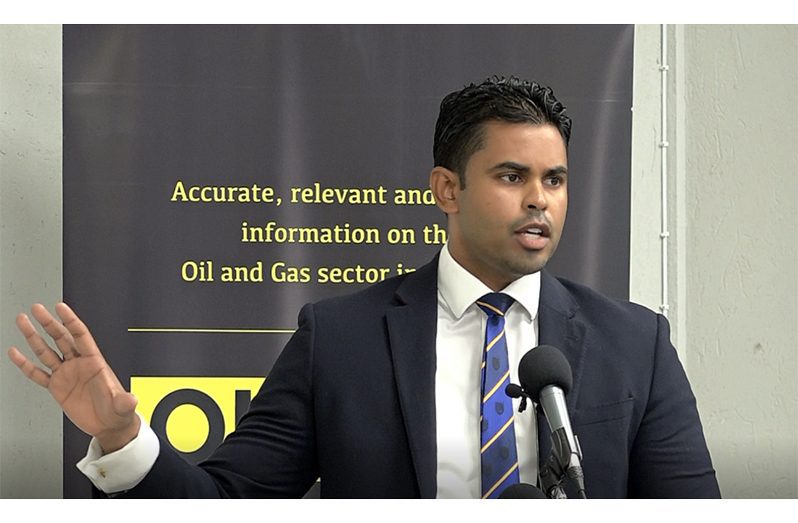— Ministers Rodrigues and Ramson respond to removal of mangroves
FOR Guyana to realise its true potential as a global powerhouse, the government has to be able to strike a critical balance between economy and environment.
This assertion was made by Minister within the Ministry of Housing and Water, Susan Rodrigues, as she responded to the recent removal of mangroves on a private plot of land at Versailles-Malgre Tout, West Bank Demerara. A section of the coastal vegetation, which primarily helps to cushion the impacts of the sea, was removed by a company named TriStar Incorporated, which is owned by Guyana-born Krishna Persaud who has the site earmarked for a $100 million wharf, and oil and gas shore base.
Responding to criticisms that the project has attracted, minister Rodrigues indicated that the undertaking was carefully examined by the government, and that the benefits to the people of Guyana outweighed the negatives. “If we want to take Guyana into the new and emerging sectors, and we want Guyana to become a next Dubai or a next Singapore, there are going to [be] tough decisions that we are going to have to make,” Rodrigues said on a virtual programme called ‘Let’s Talk Politics’ hosted by Edward Layne.
The minister admitted that if one were to examine the recent “mangrove situation” in isolation, then it would be easy to consider it a disaster; however, she urged Guyanese to ensure that their opinions are formed within context.

“This is a 100 per cent locally-owned company that will be occupying that space; that will have the responsibility of ensuring the protection of our sea defence, and that we have enough sea defence. This is going to be somebody who is going to create hundreds of jobs and spin-offs from this investment,” Rodrigues emphasised.
She added, “If we don’t create more shore bases here in Guyana, the investors are going to look elsewhere; they are going to create those shore bases in the nearest locations – Trinidad, and then all of the work will go to the Trinidadian people, and once again, Guyanese will lose out; so, we have to do a balancing act.”
She reminded that Guyana’s future is dependent on the country’s ability to pursue modernisation and sophistication in a sustainable manner.
“We have to protect our environment, but we [also] have to ensure that we can get cheaper electricity for our people; we want to bring in the gas pipeline; there may be some destruction in that, but we have to balance; we have to conduct an analysis to understand what are the benefits that will come from that,” Rodrigues informed.
In “striking a balance” and making the “tough decisions”, Rodrigues assured that the wellbeing of Guyana and its people will remain paramount.
“Whatever decisions we make, will be carefully considered and we will balance the benefits with the sacrifices we have to make,” the minister said, as she referenced the government’s move to reopen schools amid a pandemic. “That was a tough decision; it wasn’t easy to make. We had to balance the interest of keeping our people safe, [while] making sure that our children are not left behind,” Rodrigues posited. She maintained that “Guyana can get to that place where we are a fully developed country that will be the envy of the world,” but it requires a conscious commitment to prioritise and “make the tough decisions”. “…and the most important thing for us as a government is empowering and enriching the lives of our people and that our people are not left behind as Guyana transforms. While we transform the landscape, we have to transform lives as well,” Rodrigues concluded.
A MORE EXPENSIVE REPLACEMENT
Her colleague, Minister of Culture, Youth and Sport, Charles Ramson Jr. shared similar sentiments. “It is very important that people understand that we have to be able to balance the demands that are coming from the business opportunities, in order for us to rapidly transform the country,” Ramson Jr. said. He emphasised that even though the mangroves were removed, they would be adequately replaced with structures that are “far superior and far more expensive and elaborate means of protection that is important to balance”. “A lot of the times, the protection is needed that comes from mangroves, when you don’t have the money to spend on building wharfs and seawalls, etc.,” Ramson Jr. noted. He added, “If we are balancing our economic activity and the means for us to be able to create wealth in our country, and business opportunities and jobs in our country… it has to come from the development that happens on our banks and on the shores.” Ramson said that much of Guyana’s development resets on the transformation of various ports, such as airports, wharfs, and deep-water harbours. “When you’re going into oil and gas development, as Guyana is now about to, the banks now are critical for the movement of goods and services,” Ramson Jr. noted. He added too that “A lot of the activities, especially where the projects are, are off-shore. In order for you to be able to capture more business activity and economic activity in the country…they need to be able to offer the wharf services; the wharf space.”




.png)









